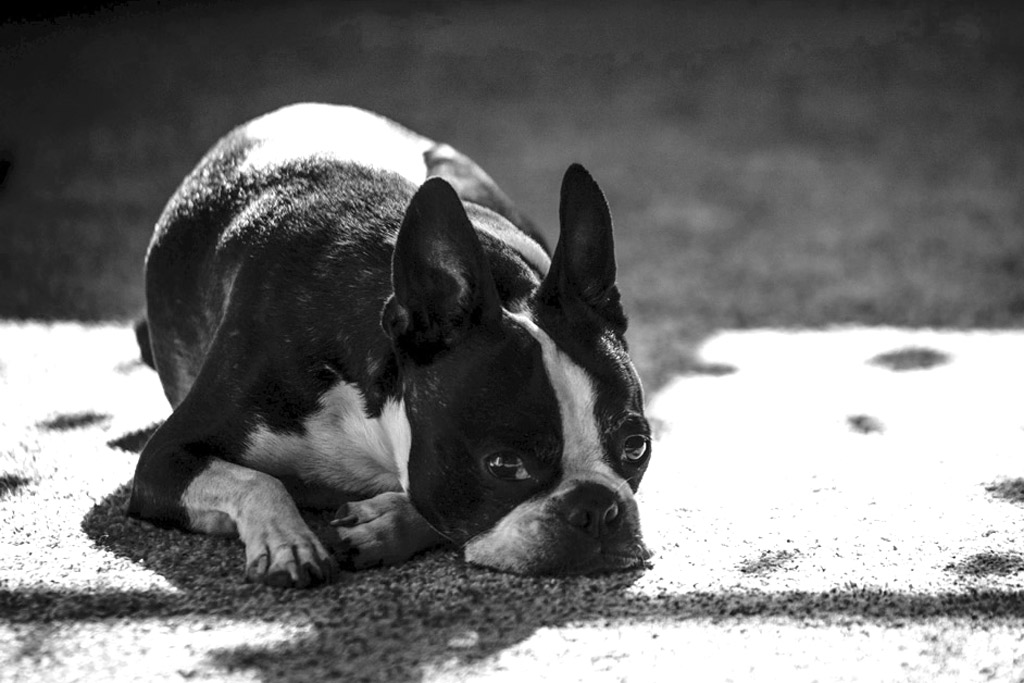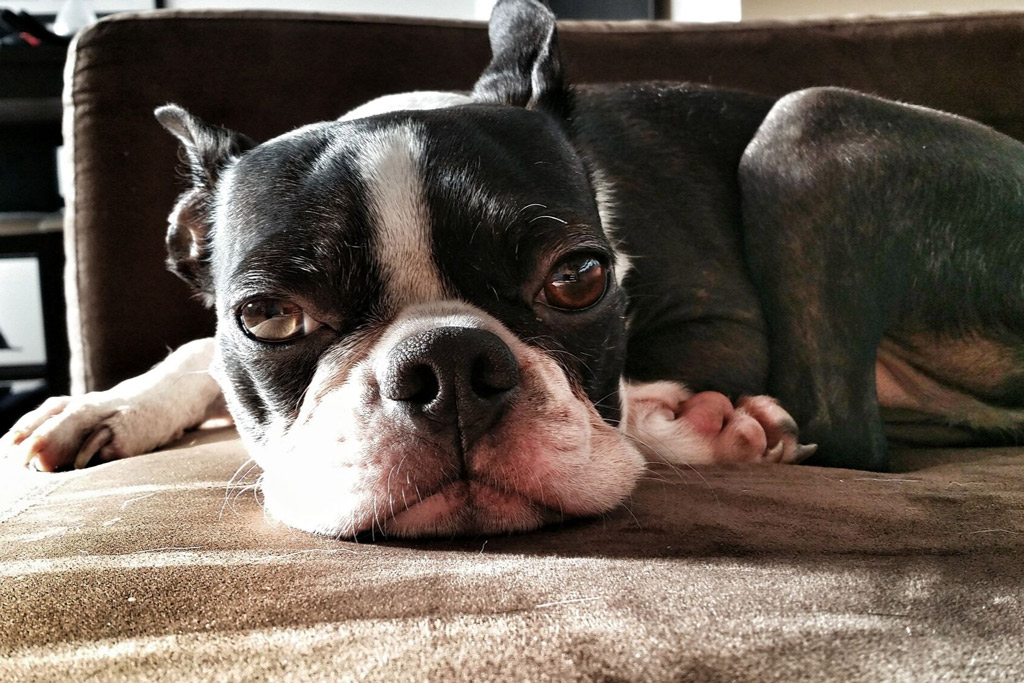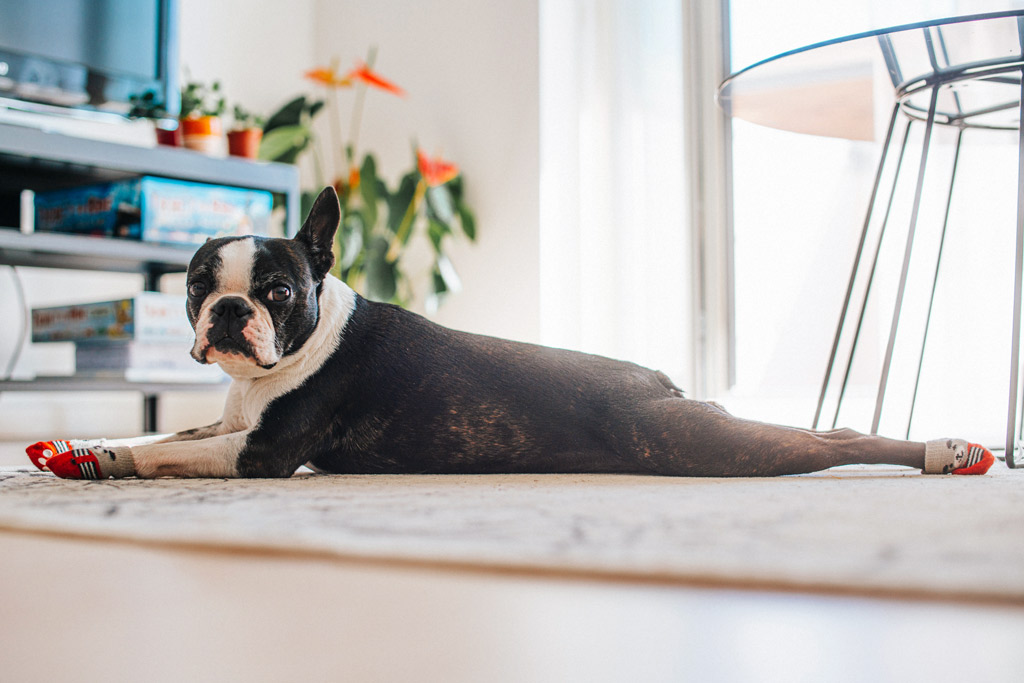
Usually, before choosing what puppy or dog to bring into your home, you’d learn about the breed characteristics, behaviour and traits to help you (and your family) make a decision.
You’ve chosen the Boston Terrier (good choice!) and during your research, one of the questions you probably have is about their lifespan:
How long do Boston Terriers live?
The Boston Terrier’s lifespan range is between 11 to 13 years. Some Boston Terriers can live for longer (15 years) or less depending on diet, environment, lifestyle and genetics.
Before bringing your dog into your home, or if you’re already a Boston Terrier parent, there are some changes/choices you can make to put your furry friend in the best conditions for a long, healthy lifespan.
Boston Terrier Lifespan
The Boston Terrier breed’s longevity range is 11 to 13 years. This is an average based on statistics, which comes from the American Kennel Club.
There have been many studies carried out by different organizations, but some agree that Bostons can live until they are 15 years old, especially when their death is because of natural causes, i.e. old age.
According to a study by The Kennel Club conducted on a small group of Boston Terriers in the U.K., the most common causes of death are:
- Old age.
- Cardiac (heart attack, heart failure and other heart problems).
- Cancer (brain tumour).
- Respiratory (respiratory failure).
- Neurologic (Meningitis and seizures).
Another British study concluded that 16% of canine deaths were attributed to cancer, which was double that of heart disease (8%).
Your Boston Terrier’s longevity depends on many factors (see below). Spotting the signs of health deterioration is key to being able to protect your dog against ageing.

Boston Terrier Ageing Factors
The four factors that influence your Boston’s rate of cellular ageing – or put another way, “looking and feeling” old – are:
- Genetics.
- Health.
- Diet.
- Environment.
Genetics Factor
Boston Terriers suffer from hereditary diseases such as hemivertebrae, glaucoma, and cataracts. The main contributors to this have been irresponsible breeding, which also causes other diseases that are being transferred to pups.
Also, due to their large heads, Boston Terrier pups are likely to be delivered by caesarian section or at least need veterinarian assistance during delivery.
This can put the mother and her pups into further health risk when the breeder or owner doesn’t take good care of their dogs.
This is why careful selection of the “who and where” is very important when choosing your Boston Terrier puppy. Since they are prone to several hereditary health problems, going for a reputable breeder has a great impact on your dog’s lifespan.
So, choose a breeder who:
- Screens the parent dogs for hereditary health problems.
- Only chooses strong, healthy dogs to breed from.
- Selects dogs with good and even temperament when breeding.
- Keeps their dogs healthy, happy and in a nurturing environment.
Health Factor
Most of the health problems associated with this breed are due to their “funny” face.
Bostons are a brachycephalic breed (flat-faced). They often have trouble breathing, are prone to overheating and also suffer from numerous eye conditions due to their prominent eyes.
Here are the health problems related to this breed:
- Brachycephalic Syndrome: The three most common disorders include stenoic nares, everted laryngeal saccules and elongated soft palate.
- Patellar Luxation: An orthopaedic health issue.
- Hemivertebrae: This is a genetic disorder which affects many brachycephalic breeds that also have screw-tails.
- Sensorineural Deafness: They are prone to suffer from ear infections that can lead to sensorineural deafness.
- Cataracts: Especially affect senior dogs. Their eyes become cloudy; it can affect a dog’s vision quite dramatically if left untreated. It’s a hereditary condition but it can also develop if a dog suffers from diabetes.
- Corneal Ulcers: A painful eye condition.
- Glaucoma: An hereditary eye condition that typically shows when dogs are around 2 years old. It can cause total blindness, rapidly.
- Cherry Eye: This is a painful condition that affects a dog’s third eyelid.
- Distichiasis: Another eye disorder where too many eyelashes grow around a dog’s eyelid.
- Keratitis Sicca: Also known as Dry Eye. It happens when an ulcer damages the cornea of your dog’s eye.
- Entropion: Another eye condition where the eyelashes grow inwards.
Also, the development of chronic or terminal diseases such as cancer or heart problems can contribute to your furry friend’s ageing process.
Thankfully, Petplan pet insurance covers all hereditary and chronic conditions as standard. Which means if your Boston Terrier inherits her dad’s bad eyes or her mom’s patchy coat, you’re covered.
Diet and Environment Factors
The following practises related to your Boston’s diet and environment deteriorates their health:
- Eating a commercially prepared, processed diet.
- Obesity and a sedentary lifestyle (lack of exercise).
- Drinking chlorinated or fluoridated water.
- Exposure to toxins in the environment, indoors and outside.
Continue reading to see how you can modify their diet and environment to help protect your pooch against some of the potentially negative effects of ageing.

Boston Terrier’s Health Deteriorating Signs
Are there signs that tell that a dog’s health is deteriorating?
Yes, and here are the most common signs of ageing in senior Boston Terriers:
- Joint problems such as pain and stiffness.
- Cognitive dysfunction such as memory loss, dementia, irritability, and confusion.
- Tooth decay, infected gums and bad breath.
- Loss of senses.
- Weight gain or loss.
- Incontinence.
Ok, so after looking at Boston Terriers’ ageing factors and signs of health deterioration, let’s see how to increase their life expectancy.
The part that plays a big role starts with this question:
What can I do protect my Boston against ageing?

How to Increase a Boston Terrier’s Life Expectancy
Here’s where you can take action to improve your dog’s health!
To recap, Boston Terriers generally live between 11 to 13 years. However, some live longer than that and others not.
In any case, you can increase your Boston Terrier’s lifespan by addressing the factors that influence their rate of cellular ageing.
Here are some simple steps you can take:
#1 – Follow a Balanced and Species-Appropriate Diet
A species-appropriate balanced diet, according to their age, will make sure your Boston Terrier gets all the nutrients needed for a healthy and long life.
Don’t skip our Boston Terrier Nutrition blog post, where you will discover more on this.
#2 – Provide Enough Antioxidants in Their Food
Make sure your Boston gets enough antioxidants in her diet.
Blueberries, for example, are a great source of antioxidants.
Read also: Can a Boston Terrier Eat Apples? 10 Other Safe Human Foods – where I talk about berries and their properties.
#3 – Control Your Dog’s Bodyweight
Maintaining your Boston Terrier’s ideal body weight improves your dog’s health and longevity.
This can be achieved with good nutrition habits (an appropriate diet) and keeping your pooch active throughout her life.
The Boston Terrier’s healthy weight charts in our Boston Terrier Growth Stages guide is a handy resource to get your hands on. Also, if you are having trouble with your Boston’s bodyweight, certainly go to How to Get Your Dog’s Weight Under Control.
#4 – Keep Your Boston Terrier Hydrated at All Times
Don’t forget about the importance of good hydration!
Supply fresh drinking water, and one that’s been filtered through a high-quality water purifier if necessary. The need for filters will depend on the quality of the water where you live.
Read also: How Much to Feed Boston Terriers? – where I talk about how much water should your Boston Terrier drink daily.

#5 – Go to the Vet For Regular Check-Ups
Scheduling and attending regular check-ups with a veterinarian work as a preventive method.
Periodical physical examinations are great to assess your dog’s health and spot disease in its early stages of development.
Also, due to the number of health issues related to Boston Terriers, check-ups are the only way to prevent or get an early diagnosis of eye conditions, for instance.
#6 – Keep Vaccinations Up to Date
The main goal of vaccines is to improve your dog’s resistance against some known and specific diseases that cause frequent problems in dogs. Always check with your vet for the vaccination schedule.
However, you can minimize unnecessary vaccinations. One of the things you can do is to request antibody titer tests to your vet to determine your dog’s true needs (one of the recommendations from Dr Karen Becker).
#7 – Provide Physical and Mental Stimulation
Like all dogs, Boston Terriers require both physical and mental stimulation throughout their life. Depending on their age, their exercise needs change, but they don’t disappear.
Follow the tips laid out in our Boston Terrier Exercise Guide for how to exercise your pooch at every life stage.
#8 – Limit Air and Product Toxins at Home
Using an effective air purifier in your home will reduce airborne toxins. Alternatively, or as well as, you can to use houseplants like Spider plant and Chrysanthemum for great air quality free of toxins.
Avoid toxic home furnishings, synthetic air fresheners, and harsh chemical-laden cleaners.
Finally, steer away from shampoos and treatments such as flea and tick treatments that contain potentially hazardous ingredients and harsh chemicals.
Creating a dog-friendly home that is toxin-free is not only beneficial for your pooch but also every member of your household. Discover more in How to Make Your Home Dog-Friendly and Safe.

In Summary
Of the 8 steps outlined above, getting enough antioxidants, an appropriate diet and regular check-ups might be the most important things that you can do to protect your Boston Terrier!
It takes little effort but the rewards are huge, as these steps add years to the life of your Boston Terrier (which is what every dog parent wants!).
Finally, the key to a happy and healthy Boston Terrier has much to do with a dog’s welfare needs. Boston Terrier Care is a great next step to take. 😉

My Boston will be 15 years old in January 2021. The only thing that I notice that has changed is she's sleeping much longer and deeper and her hearing is not good. Her eyesight is perfect. What I'm trying to determine is when she'll be moribund. I don't want her to suffer.
Hey Tom, I completely understand your sentiment. You have without a doubt been doing an outstanding job taking care of her! Speak to your vet about this, and continue to cherish every single day with her 🙂
My Boston Terrier w positive birth date, is 16 years 7months. Nags all the time for his breakfast, to
go out and loves his treats…Takes pain med, has tumor leg and back end, non operational…but off
he goes in fact pushy about his schedule….I aways cook cup of runny rice w a chicken piece/carrot over
his good dog food and share my H/A Joint formula w him..Eats a lot pees a lot and walks around once
help him up…. Goes to vet regularly.
My Boston Boy, Oochi, aka Patch has just had his 16th birthday…snoozin…eats alot, love his food and
dog bone ea morning. Sleeps in my bed all his years, he takes pain meds for his arthisis, and pees where
he shouldn't, lucky tile floors- forgive him…H/A Joint and I cook piece of chicken w rice and put over his dry Iams…and carrot in the rice, slusshy
and if i have a piece of steak I share…. Doesn't see well….going good in his 17th year…..